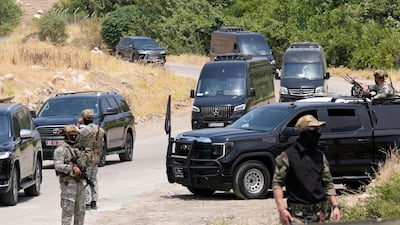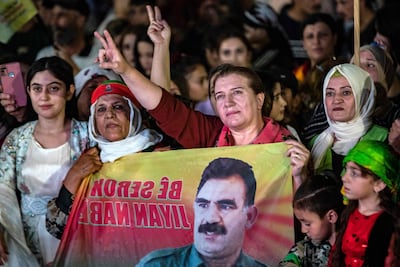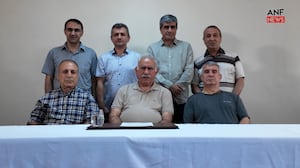Fighters from the Kurdistan Workers' Party (PKK) began laying down their weapons on Friday at a symbolic ceremony in northern Iraq to mark the end of their decades-long armed struggle against the Turkish state.
The PKK announced in May that it would disarm and disband in response to calls from jailed leader Abdullah Ocalan, as part of a peace process with Turkey's government. The group is designated a terrorist organisation by Ankara, the US and EU.
The ceremony, which took place near Sulaymaniyah in Iraq’s semi-autonomous Kurdish region, is the first concrete step by the group towards disarmament, despite it being largely ceremonial and a gesture of goodwill. Some 30 fighters burned their weapons outside a cave west of the city, a PKK official told The National.
"We are destroying our weapons in front of you, of our own free will, in line with our ideology and based on democratic integration laws," the group of 30 fighters, calling themselves the Peace and Democratic Society Group, said in a statement.
They said they were committed to democratic politics and legal means. “Repression and exploitation will end; freedom and solidarity will triumph. The peace and democratic society process will undoubtedly succeed," they added.








Founded in the late 1970s by Ocalan, the PKK took up arms in 1984, carrying out a string of bloody attacks on Turkish soil that sparked a conflict that has cost more than 40,000 lives.
But in May the PKK said it would pursue a democratic struggle to defend the rights of the Kurdish minority in line with the historic call by Ocalan, who has been serving a life sentence in Turkey since 1999.
The ceremony took place at Jasana Cave about 50 kilometres west of Sulaymaniyah. The cave is a symbol of Kurdish resistance, having served as a place of refuge in the 1920s against British colonial forces and decades later during the fight by Kurdish Peshmerga forces against Iraq's former Baathist regime.

Footage from the ceremony showed the fighters, half of them women, queuing to place AK-47 assault rifles, bandoliers and other guns into a large grey cauldron. Flames later engulfed the guns as Kurdish, Iraqi and Turkish officials watched nearby.
The fighters, in beige military fatigues, were flanked by four commanders including senior PKK figure Bese Hozat, who read a statement in Turkish declaring the group's decision to disarm.
Turkey's Interior Minister Ali Yerlikaya said "words can speak louder than weapons" now that the PKK had begun its disarmament process.
"A terror-free Turkey is the triumph of faith in brotherhood," he wrote on X.
The ceremony was attended by Turkish and Iraqi intelligence figures, officials of Iraq's Kurdistan regional government, and senior members of Turkey's pro-Kurdish DEM party - which has played a key role this year facilitating the PKK's disarmament decision.
The Kurdistan Community Union, an umbrella group that includes the PKK, previously issued invitations to the ceremony to local political parties, but these were rescinded on Tuesday due to the “security situation”.
In an interview with Turkish channel TV100 broadcast on Friday morning, Turkish justice minister Yilmaz Tunc said the PKK's disarming and dissolution could pave the way for Turkey to "become one of the most powerful countries in the world".
The PKK "was not only an obstacle to economic development and progress, it was also a dagger struck at our unity and solidarity", he said.
Omer Celik, spokesman for Turkey's ruling AK Party led by President Recep Tayyip Erdogan, said the ceremony marked a first step towards full disarmament and a "terror-free Turkey", adding that the process must be completed "in a short time".
Nebi Mis, an analyst at Seta think tank, which is close to the Turkish government, said the ceremony could serve as a propaganda tool for PKK or offend relatives of those killed by the group - highlighting the sensitivities in Turkey over the process of dissolving the group.
"Images of weapons surrendering in the presence of large guests and the media should not be turned into propaganda for the organisation," Mr Mis wrote in a column for the Sabah newspaper.
He raised the question of what happens to the rest of the PKK's weapons.
"The crucial point is that the weapons be laid down and the inventory of the remaining weapons be properly maintained. Gray areas should not be left," he said. "The transfer of some of the weapons to other regions should be prevented."
Ocalan had pledged in a rare video message released on Wednesday that the disarmament process would be “implemented swiftly”.
“I believe in the power of politics and social peace, not weapons. And I urge you to put this principle into practice,” he said.
"The PKK's decision to say farewell to arms has provided assurance that not only the Kurdish issue but all of Turkey's problems will be resolved through democratic means," Tulay Hatimogullari and Tuncer Bakirhan, the co-chairs of the pro-Kurdish Peoples' Equality and Democracy (DEM) Party said in a statement on Friday afternoon.
"This step ushers in a new era not only in the Kurdish people's legitimate struggle for freedom, but also in Turkey's and the entire Middle East's quest for peace, equality, and democratic transformation," they added.
Kurdish political analyst Shaho Qaradaghi said on Friday: "Today, the Cave of Jasana marks the beginning of a new peace in the region."

